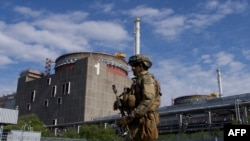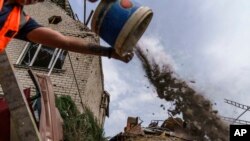The United Nations is calling for immediate access to a nuclear power plant as Russia and Ukraine again Friday accused the other of firing weapons near the plant.
Ukrainian officials said Russian forces fired more than 40 rockets at the city of Marhanets, which is across the Dnieper River from the power plant.
The region's governor, Valentyn Reznichenko, said three civilians, including a 12-year-old boy, were wounded in the attack.
Russia accuses Ukraine of firing at the plant.
Heavy fighting and artillery shelling in the area of the plant were reported Friday.
The head of the International Atomic Energy Agency said there's "a real risk of nuclear disaster" unless the fighting stops and inspectors are allowed inside the facility.
"This is a serious hour, a grave hour," IAEA Chief Rafael Grossi said late Thursday during a U.N. Security Council meeting. "The IAEA must urgently be allowed to conduct a mission to Zaporizhzhia."
Russian forces who occupy the plant have been accused of using it as a shield to fire at Ukrainian army positions. Heavy shelling in areas near the plant has been reported over the past two weeks.
Russian soldiers control the facility, but Ukrainian staff are continuing to operate the plant.
"We know that the Russians have been there for some time. We also know that the Russians have fired artillery, I think specifically rockets, from around the power plant," a senior U.S. military official told reporters Friday, refuting Russian allegations that the plant has been targeted by Ukrainian forces.
"I don't have any belief that the Ukrainians, who know very well what the impacts of hitting that power plant would be, have an interest in hitting the power plant," the official added.
Separately, U.N. Secretary-General Antonio Guterres warned in a statement that the Zaporizhzhia nuclear power plant "must not be used as part of any military operation."
"Urgent agreement is needed at a technical level on a safe perimeter of demilitarization to ensure the safety of the area," he added.
In other developments, Ukrainian President Volodymyr Zelenskyy on Friday urged the United States and other countries to label Russia a state sponsor of terrorism, saying in his nightly video address, "After everything that the occupiers have done in Ukraine, there can be only one approach to Russia — as a terrorist state."
A senior Russian official said Friday that ties between Moscow and Washington would be badly damaged if the U.S. Senate were to pass a law labeling Russia a state sponsor of terrorism.
The action would be "the most serious collateral damage for bilateral diplomatic relations, to the point of downgrading and even breaking them off," Russia's Tass news agency quoted Alexander Darchiyev, head of the North American department at the Russian Foreign Ministry, as saying.
Meanwhile, a senior Ukrainian official claimed 60 Russian pilots and technicians were killed and 100 people were wounded at the Russian-operated Saki military air base in western Crimea on Tuesday.
Russia claims that only munitions stored at the airfield exploded, but Anton Gerashchenko, an adviser to Ukraine's minister of internal affairs, told The New York Times on Friday that was "a blatant lie."
The U.S. on Friday said its own assessment indicated that several Russian fighter jets, several Russian fighter-bombers and a Russian surveillance aircraft were destroyed, along with a "pretty significant cache of munitions."
Satellite images taken earlier this week showed several fighter jets and at least five bombers destroyed at the base, according to a British military intelligence report.
The British defense ministry said Saturday on Twitter that Russia is likely having trouble providing supplies to its military in Ukraine on the west bank of the Dnipro in Kherson Oblast because two of the area’s primary road bridges are out, following damage by Ukraine.
The ministry said Russia has been using a pontoon ferry to provide supplies to several thousand troops stationed on the west bank since late July. “Even if Russia manages to make significant repairs to the bridges,” the ministry said, “they will remain a key vulnerability.”
Some information for this report came from Reuters, The Associated Press and Agence France-Presse.







